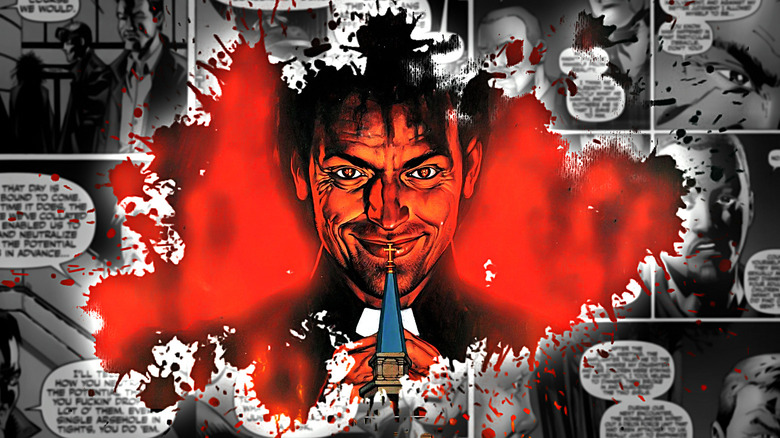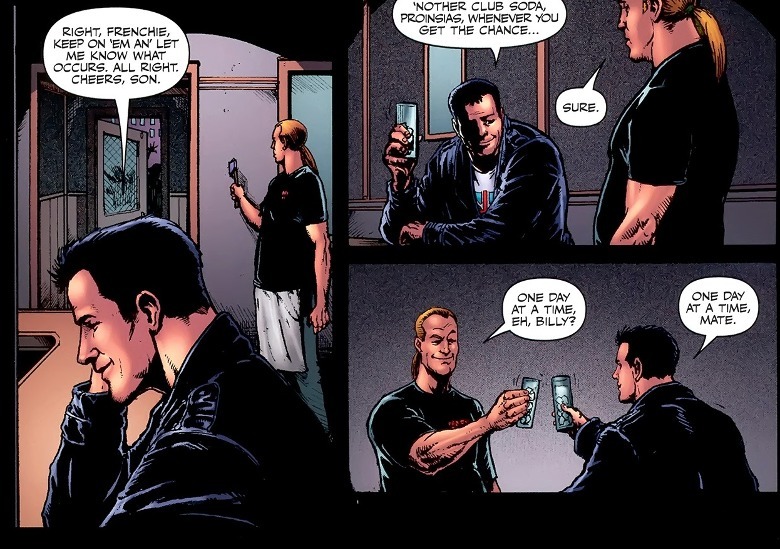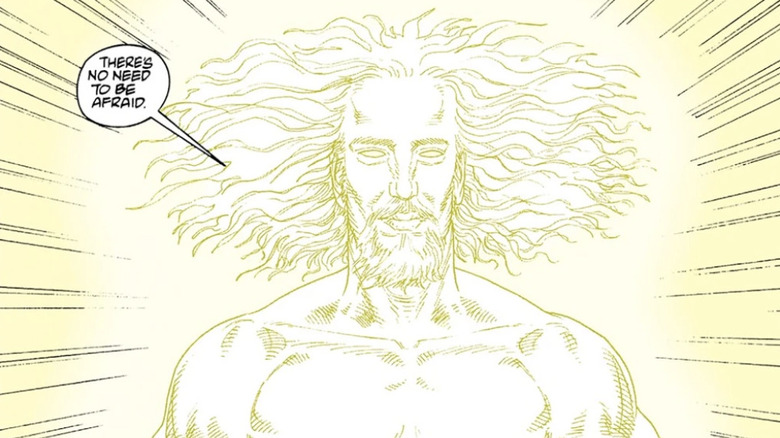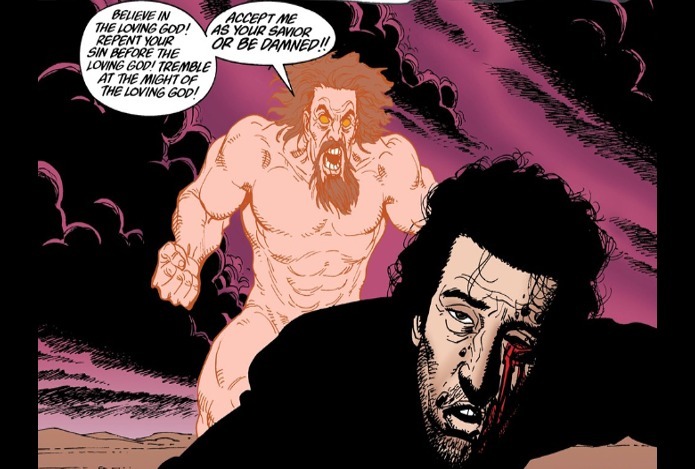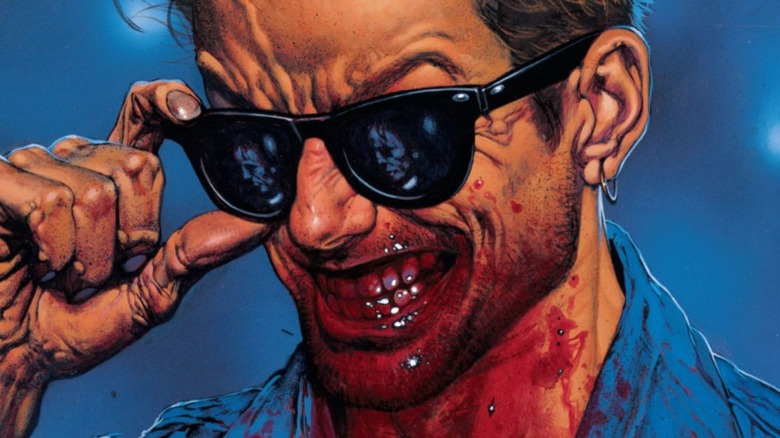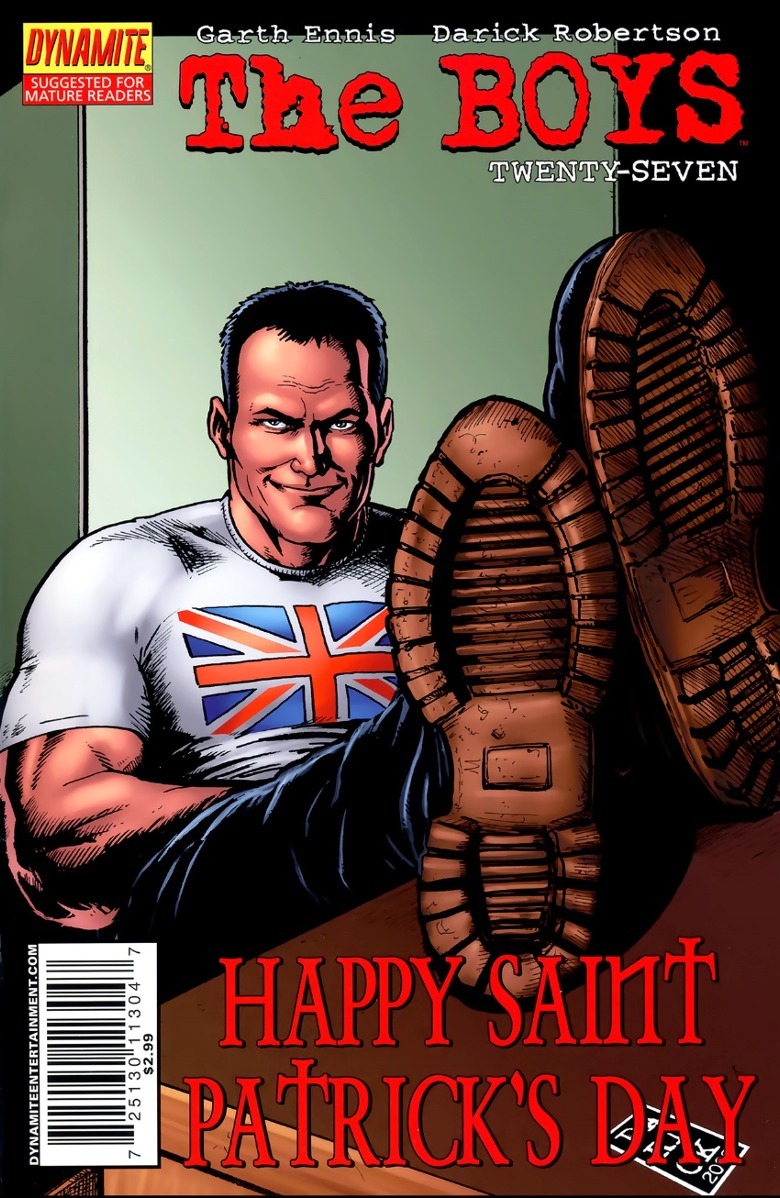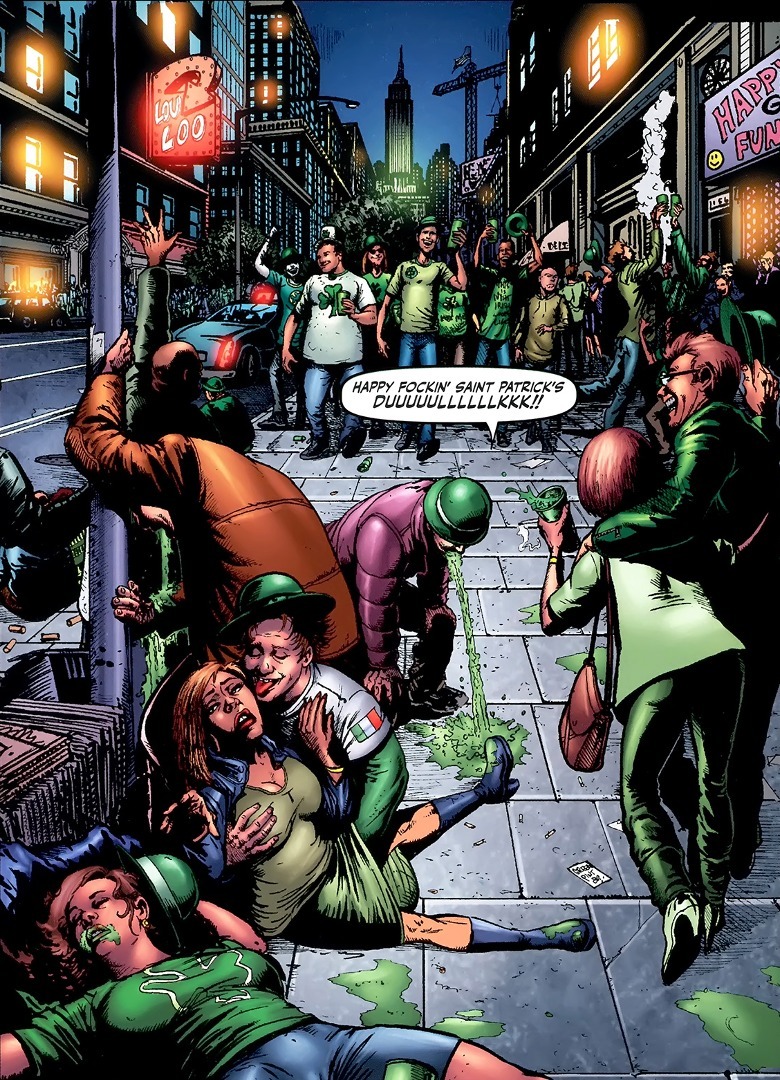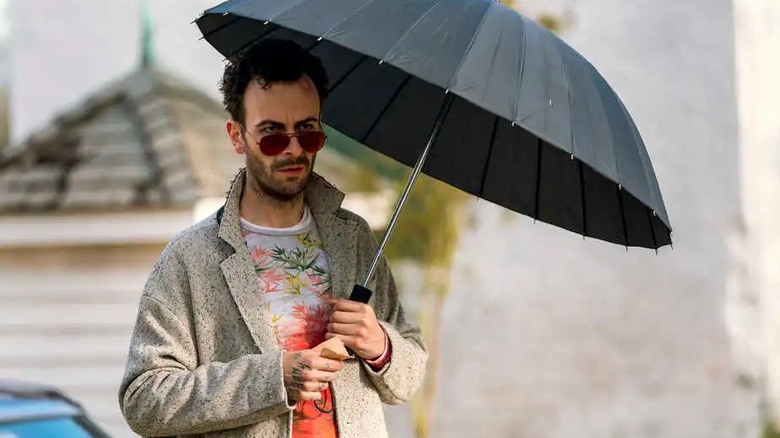The Boys Has A Preacher Cameo You Probably Missed
These days, "The Boys" is the most famous Garth Ennis comic due to its Prime Video TV adaptation. (Read our /Film review of "The Boys" season 4 here.) Even so, "The Boys" is not my favorite Garth Ennis comic.
I'm an avowed fan of "Sara," Ennis' Soviet-set World War 2 comic (drawn by Steve Epting) that has none of his usual crass humor. His best long-running comic is "Preacher" (drawn by the late Steve Dillon). A neo-Western road comic, "Preacher" has three main characters: Jesse Custer, a preacher who can command people to obey him with "the word of God," his tomboyish girlfriend Tulip O'Hare, and the Irish vampire Proinsias Cassidy. (His name is the Gaelic version of "Francis," and means "Frenchman.")
"Preacher" is as much a satirical black comedy as "The Boys" is, but it focuses more on religion than on corporations and superhero comics. God has left Heaven and all is not right with the world, and Jesse, Tulip, and Cassidy are on a quest to find him.
There are no superheroes in "Preacher," but a cameo in "The Boys" #27 suggests that the two comics share more than a sense of humor. "Preacher" and "The Boys" take place in the same universe, because Billy Butcher is buddies with Cassidy. In said issue, Butcher and Hughie visit a New York City bar owned by a man named "Proinsias."
"Preacher" ended with Cassidy becoming human again, and he apparently took that second lease on life to finally open the bar he always dreamed of. He looks little like he used to, but how many fellas do you know named "Proinsias"? Cassidy's appearance in "The Boys" also revisits some ideas that Ennis first explored with the character in "Preacher."
Preacher and The Boys both criticize blind faith in religion
During "The Boys," good Christian girl superheroine Annie January/Starlight slowly loses her faith in God. She learns her heroes aren't heroes at all when, to join the Seven as Starlight, she's sexually coerced by A-Train, Black Noir, and Homelander. One scene shows her in a Church, wondering if God can hear her. If "The Boys" and "Preacher" are in the same world, he literally can't — because he's dead.
"Preacher" ends with God dying; he may claim to be a "loving God" but saying so doesn't make it truth. He's really more an abusive father, who makes his children suffer to test if their love for him will still last. If it doesn't, they never deserved his love in the first place. After all, what "loving God" would make his children suffer for all eternity to punish them not believing in him?
Before Christianity even existed, Greek philosopher Epicurus wrote how the conception of God as an all-powerful yet all-loving being, is a fundamental contradiction. If God can prevent suffering in the world but chooses not to, he is either not all-powerful or not all-good; God's supposed power and goodness would be, in truth, mutually exclusive. Ennis opts for the second answer, writing God as a narcissist who created mankind because he needed someone to love him. Whenever he's questioned, the white angelic light he emits shifts into a furious red.
So, Jesse decides mankind will be better with God gone; blowing the creator's brains out is a very literal manifestation of Ennis saying we've outlived the usefulness of religion. The skepticism of superheroes in "The Boys" has a similar message; there's no super-powerful man in the sky watching over us, and if there were, it'd be more trouble than it's worth. Only we can save ourselves.
In Preacher and The Boys, Garth Ennis writes about being Irish American
"The Boys" issue #27 is part of the controversial "We Gotta Go Now" arc, where Hughie is sent to infiltrate the G-Men (an X-Men parody). The cover declares "Happy Saint Patrick's Day," but it's written in red, not Irish colors like green or orange. The cover also depicts Butcher, an Englishman, wearing a white shirt with a Union Jack. Ennis, who's from Northern Ireland, is technically both Irish and English; that he identifies so heavily with Butcher also reflects that.
The issue itself isn't any more celebratory of the holiday. The story's conclusions are that Irish Americans use St. Patrick's Day to "celebrate their heritage" but just take that to mean getting face-in-piss-drunk.
Cassidy even has a "No Irish on Saint Patrick's Day" policy in his pub. I'm pretty sure that Darick Robertson's cover, celebrating the people who oppressed the Irish and stole their land, is Ennis also being cheeky to the Plastic Paddies of NYC; the people who would feel most indignant about that cover aren't even really Irish.
Ennis feels that his anti-religion views, the backbone of "Preacher," are intertwined with his Irishness. In an interview with Previews World, he said: "My disdain for organized religion comes from growing up in a province where people are fighting a religious war. Which, if you're an atheist, makes no sense at all because it's people fighting over how they worship their imaginary friend."
He's of course referring to the Troubles, where the Irish Republican Army waged a terrorist campaign in the name of a unified Ireland. The IRA was mostly made up of Catholics, a minority in the six Northern Irish counties compared to the Loyalist Protestants. The Troubles lasted from the 1960s until the Good Friday agreement in 1998. (No matter what "Star Trek" says, a truly united Ireland remains a dream.)
In "Cry Blood, Cry Erin" ("Preacher" #25-26), Ennis reveals Cassidy's backstory. Before coming to America, he fought in the 1916 Easter Rising — but concluded the green hills of Ireland weren't worth dying for. By making Cassidy a member of the Irish diaspora, Ennis is writing about his own experiences as an Irish American immigrant. He's also criticizing the Irish American romanticism about the struggle for Irish liberation, even though they have little connection to or understanding of what Ireland is today. Ennis, unlike Irish Americans, had to grow up around the IRA and sees them as terrorists, not heroes.
Take former Republican Congressman Peter King, who supported the IRA until they denounced the USA's 2003 invasion of Iraq. Apparently he didn't realize the "Republican" in the group's name means something different across the pond. (The IRA is a left-wing organization, and longtime Sinn Féin President Gerry Adams is a socialist.) Ireland is also one of the countries most supportive of Palestinian rights, since they understand what it's like to live under occupation. Meanwhile, outgoing President Joe Biden, an Irish American and proud of it, has been highly criticized for not supporting Palestinians.
Preacher remembers America is a nation of immigrants
The one superhero who Ennis does like is Superman; remember, both Ennis and Kal-El are immigrants. In Ennis' "Hitman" issue #34, antihero Tommy Monaghan chats with Superman. According to Tommy, America is not the greatest country in the world because people who come to America for better lives "hang onto all the things that got them into trouble in the first place." Superman, though, chooses not to divide people up like that, and instead says: "I'm American. What can I do to help?" Unlike the nationalistic America personified in Homelander on "The Boys," Superman's America is one that does accept the tired, the poor, and the huddled masses yearning to breathe free.
Cassidy has a similar attitude in "Preacher" — he considers New York his true home, not Ireland. He tells Jesse that no matter which part of America he travels to, the Big Apple always pulls him back.
Seth Rogen and Evan Goldberg (who produce "The Boys") previously produced a "Preacher" TV series that aired on AMC for four seasons between 2016 to 2019. "Preacher" ended the same year that "The Boys" began. "Preacher" the TV show starred Dominic Cooper as Jesse, Ruth Negga as Tulip, and Joseph Gilgun as Cassidy. Like "The Boys," it took plenty of liberties with the source material.
Could the TV shows follow the comics, with Joseph Gilgun showing up for a quick cameo in "The Boys" season 5? That might be a problem due to the two shows having different production and distribution companies. Then again, "Preacher" was published at DC's Vertigo imprint and "The Boys" was published at Dynamite Entertainment. (Ennis even originally pitched "The Boys" as being set in the DC universe, but the publisher pulled it after six issues and let Dynamite take over.)
If Rogen and Goldberg are feeling as cheeky as Ennis often is, they could slip Gilgun into a single scene of "The Boys" and, with plausible deniability, let fans piece together that he's playing Proinsias.
